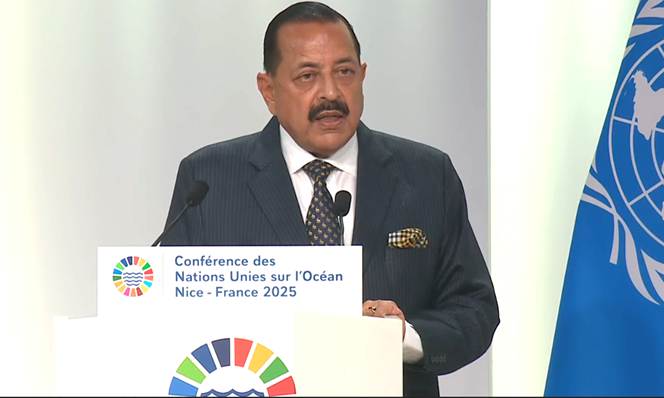India leads global push for Ocean Conservation at UNOC3, unveils Deep-Sea Mission and plastic clean-up initiatives

India, represented by Union Minister of Earth Sciences Dr. Jitendra Singh, reinforced its global leadership in ocean conservation at the Third United Nations Ocean Conference (UNOC3) in Nice. The country highlighted its multi-faceted strategy encompassing deep-sea exploration, marine plastic clean-up, sustainable fisheries, and enhanced governance mechanisms.
Deep Ocean Mission & ‘Samudrayaan’ Project:
- India plans to deploy its first manned submersible by 2026 to explore ocean depths up to 6,000 meters.
- This marks a major advancement in indigenous deep-sea research and scientific capability.
- Marine Pollution & Plastic Clean-Up Initiatives:
- Over 1,000 km of coastline cleaned and 50,000 tonnes of plastic removed under the Swachh Sagar, Surakshit Sagar campaign.
- Proposal for a legally binding Global Plastics Treaty and support for ratifying the BBNJ (Biodiversity Beyond National Jurisdiction) Agreement.
- Draft marine litter policy in place, reflecting India’s commitment to sustainable ocean management.
- Blue Economy & Fisheries Development:
- Sagarmala Programme and PMMSY modernizing ports and fisheries: $80 billion in infrastructure projects, $2.5 billion investments in fisheries.
- Fish production increased by 10%; over 1,000 Fish Farmer Producer Organizations established since 2022.
- Restoration of 10,000+ hectares of mangroves and shoreline management using nature-based solutions.
- Marine Governance & International Leadership:
- Expansion of Marine Protected Areas to 6.6% of India’s EEZ.
- Co-leadership in Blue Talks with France and Costa Rica; participation in India-Norway Marine Spatial Planning session.
- Launch of SAHAV digital ocean data portal for transparent, science-based management.
- Strategic Significance:
- Demonstrates India’s transition from a coastal nation to a global ocean policy leader.
- Aligns with SDG 14 (Life Below Water) and integrates ocean-based climate actions into Nationally Determined Contributions under the Paris Agreement.
- Advocates for global investment in ocean innovation, legal frameworks, and sustainable governance.
Conclusion: India’s initiatives at UNOC3 underscore a holistic approach combining scientific innovation, policy measures, and international cooperation. UPSC aspirants should note India’s proactive role in marine governance, the Deep Ocean Mission, Blue Economy initiatives, and commitments under SDG 14 and Paris Agreement frameworks.
Updated - 10 June 2025 ; 9:56 PM | DD News
India UNOC3 Deep Ocean Mission Samudrayaan Swachh Sagar Surakshit Sagar Global Plastics Treaty BBNJ Agreement SAHAV Portal Blue Economy Sagarmala PMMSY Marine Protected Areas Fisheries Development Mangrove Restoration Marine Spatial Planning Ocean Governance SDG 14 Climate Action Sustainable Development UPSC Marine Pollution Indigenous Technology